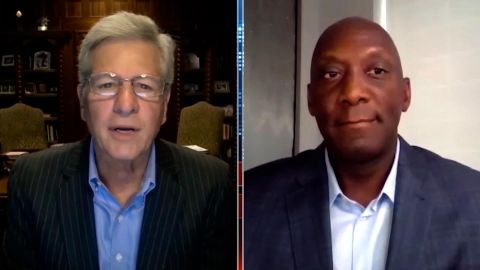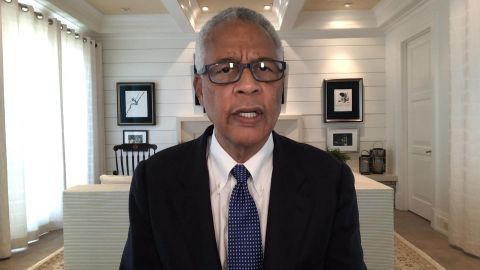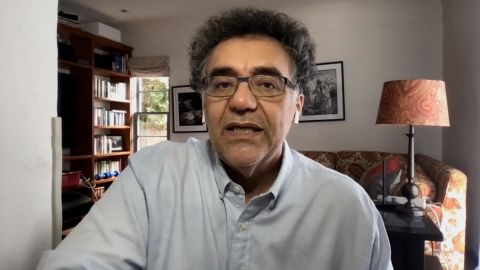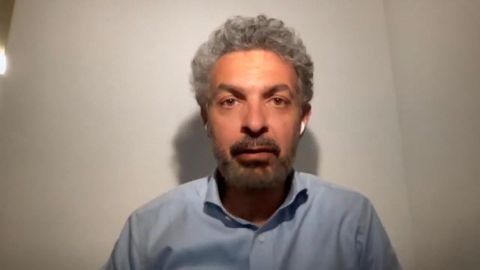Read Transcript EXPAND
BIANNA GOLODRYGA: Well, earlier, we spoke about bridging racial divides. And now we want to take a look at how big business is tackling the problem. Over 100 CEOs have come together and formed CEO Action for Racial Equity. Their goal? Addressing systemic racism and creating lasting change through public policy. The CEO of that initiative, Roy Weathers, and Denny’s CEO John Miller are determined not to let politics stand in their way. Here they are speaking to Hari Sreenivasan about how they plan to achieve that.
(BEGIN VIDEOTAPE)
HARI SREENIVASAN: Bianna, thanks. Roy Weathers, John Miller, thank you both for joining us. Roy Weathers, let me just rattle off a quick list of some of the things that your CEOs and the organization kind of came up with together to say that we can tackle these problems. And it was the digital divide, declaring racism a public health crisis, policing misconduct, telehealth, food equity, early childhood education, decriminalizing poverty, expanding financial access. Now, these are all usually the purviews of state and federal legislatures, right? I mean, what — why do you think that your group is going to be able to solve some of this or accelerate progress toward it?
ROY WEATHERS, CEO, CEO ACTION FOR RACIAL EQUITY: John and many of our other corporations employ hundreds of thousands of employees throughout the country. And so our ability to know our state legislature, governors, city and city council and mayors, because we work in those communities is a natural fit. And so we do our work internally. I call it the think tank part. And then the do tank part is really, how do we support and collaborate? Many times, encouraging bipartisan behavior is something that’s missing. And that’s one of the things that we pride ourselves in doing is saying, stay at the table, continue to work on these issues, do it in a collaborative way to get an outcome. And we — in business, obviously, policy is not new to business. Regulation and the regulatory environment is not new to business. What we’re doing is turning some of our attention, our talent on the area of societal change and racial equity and equality.
SREENIVASAN: So, Mr. Miller, some of these are going to sound like progressive or liberal causes. And in the polarized country that you are operating all of these restaurants in today, does a manager in one location or a franchisee say, you know what, this really shouldn’t be your business, let’s just work on getting pancakes, waffles and dessert on the table and keep customers happy, and let’s leave the politics to the politicians? Why are you, corporate office, talking about these things and doing these things?
MILLER: I think brands taking stands is dangerous territory. Historically, people said, we’re staying out of politics, we have constituencies, we have guests, we have shareholders that are from all these different and disparate backgrounds that don’t agree on politics. But, at the same time, I think there’s a certain mood in the country that says, but we do need problem solvers. Business leaders tend to have people with all these disparate backgrounds working together side by side. And so I think, more and more, the mood of the country is, can we do things that bring us together in a powerful, united way? United, we stand. Divided, we fall and fail. And that’s true of our country, our families, or anything you apply a division of logic to. And so now, more than ever, we need to step up and say, look, forget the politics. Focus on solving these problems. Can we come together and apply some reform where it’s needed? We’re always put — someone will stick a microphone in front of you and say, do you back the blue or do you back BLM or do you — any number of ways which within a sound bite can divide people, rather than unite them. And so I always say, I am for solutions that bring people together. And if we can just sort of move the narrative there, people tend to drop their guard and go, you’re right. How can we solve these problems together? How can we do something powerful through collaboration together? We’re really not worried about the politics these days.
SREENIVASAN: So, Roy, for example, on digital divide or telehealth, how would you measure that sort of success? How would you know that this problem is moving away from a problem and toward a solution because of your involvement?
WEATHERS: Whether you’re talking about the digital divide or whether you’re talking about telehealth, that gets to the heart of unique challenges in the communities. Primary health care in certain neighborhoods, for example, is a well- documented, long, many, many years of well-laid-out reasoning and observation. We believe that there are aspects of telehealth that starts to move that forward and close that gap, as evidenced by what we had to do in the pandemic, right? When you couldn’t get to a doctor, you actually had to rely on telehealth. And we saw and we continue to see that it was a meaningful adjustment that we made that could help the communities. And so, from our perspective, we look at the data, we talk to the community, we talk and listen to what policymakers are thinking and we look for those gaps and opportunities to say, look, here is what the data is telling us. And here is where we think the opportunity is with Telehealth. When you talk about the digital divide, I mean, from an educational perspective, just start there. All the challenges that we saw firsthand around kids and certain communities not being able to connect and receive basic education because they didn’t have the broadband capabilities. Those are obvious. Just obvious problems. I mean, and so, our area is what through the racial equity lens through a data-led analysis, listening, collaborating, where do we think we can help make a difference? And that is where we’re focusing.
SREENIVASAN: So Roy, for example, let’s tackle decriminalizing poverty. What kinds of policies would you want to be supportive of? Where would you try to get involved and, you know, try to tip the scales, if you will, on making progress here?
WEATHERS: Yes. So, decriminalizing poverty area is really about fines and fees. And so, if you look at the country there are a number of states. And there is, you know, legislation in flight, for example, at the federal level where fines and fees impacting one’s ability to maintain their driver’s license, for example. We’re not talking about serious crimes. We’re talk about parking tickets and other things that ultimately impact one’s ability to continue to work. You find that those hit, those who are – – who have less economic means harder than those who have the ability to pay. And so, scaling and looking around the country, which is part of what we do in business, we do analysis. We do analytics. And understand where things are working that benefits the community, benefits the state the city, the municipality and helping to scale those in other areas of the country are — that’s the kind of work wore doing. And so, when we talk about decriminalizing poverty, we’re essentially saying, if you don’t have the means to pay your parking ticket and there are ramifications to that, that starts to circular event around your life, should we pause and look at that? Those are the types of things that we’re focused on there.
SREENIVASAN: So, John Miller, what does that mean for your involvement as a company and perhaps your involvement as an individual? Because unfortunately we are in a system that rewards access to those who contribute more. So, whether it is a corporate donation to a political action committee or individual donation to a senator, that’s how you get your voice heard in America. And pardon my cynicism. But — so, does that mean that Denny’s will start making contributions to candidates or groups that support these specific things?
JOHN MILLER, CEO, DENNY’S: Many companies like ours have lot of experience where we’ve had our own corporate social responsibility contributions. We have, you know, deep efforts with our entire team engaged from our headquarters and throughout our entire franchise community in a number of areas that matter a lot to us. So, one of those is food inequities. So, we are a fairly significant contributor every year in raising money for the No Kid Hungry Campaign but also to end childhood hunger in America we focus a lot of on early learning centers locally and then we focus a lot on giving access to education through our Hungry for Education program. And I don’t say those things to sort of give credits to Denny’s. A lot of big corporations do lot of great things. I say that to say we know a lot about those areas. So, we can contribute influence on what success looks like and programs that work really, really well and seem to be moving the numbers a lot. And we can also give evidence from quality research that we’ve funded and supported through the years on programs that fail. So, when it comes to the CEO action effort, setting the agenda on the top priorities for the nation, we’re able to influence in a positive way through our fellows the kinds of programs that should be taken out to more of a national problem-solving effort. I don’t think any one corporation has enough money to buy policy change. It has to be done through influence and narrative towards solutions that actually work.
SREENIVASAN: John, I know that, you know, 1994 there was kind of a painful chapter. You had to pay up on a class action lawsuit. It was $50 million. You started a racial sensitivity training program over the treatment of black customers. What have you learned in that time? And what is the thing that, you know, triggered for you maybe after the death of George Floyd or how this reckoning conversation is happening in the country that there needs to be more done or take some of those lessons that you have learned and scale it larger?
MILLER: Well, first, going back to 1994, that was obviously a long time ago. There are number of employees that were here then and lived through it and lived through the pain of it and would say that even then, that did not represent the spirit of our organization and they are quite proud of the heritage over time, but those stints were quite unfortunate and I would say probably fairly well mismanaged and the records stands for itself. But today, the whole goal is to be a model organization as a result of that. So, out of the broken places can come tremendous strength and commitment. And we are very, very proud of our workforce diversity, our DEI Department, their efforts, it is quite extraordinarily. And we think it is important to be able to, you know, demonstrate for people how things should be done. So, where we fall short, you know, we humbly continue to strive and close the gap. But we are a company that arrived a little ahead of many other companies that our multi-cultural groups represent the majority of our customer base. So, the majority of our customers are minorities. And we think that our workforce should reflect that. We have nearly an 80 percent minority workforce at manager level but more than 50 percent minority workforce. Our board is 55 percent people of color. 44 percent women. Our system is 96 franchised owned. Of those 1,600 plus franchised restaurants, half of those are owned by minorities. So, in terms of being able to provide a starting place, a restart for people that had been imprisoned, a place to build a career, a place to jump off from a career and get a good start, a place to build ownership through franchising, we’d like to be model in all of those areas to demonstrate what good corporate governance should look like in terms of philanthropy and giving back and community investment. We’d like to be model there as well. So, I think that, you know, out of that history comes a deep commitment that runs throughout the enterprise. It is literally who we are. These are not debated topics. These are not strivings of someday we’d like to be kind of ideals. These are here and now, with every decision, every day, running every shift every day, a makeup of Denny’s.
SREENIVASAN: Roy, how do you council companies on the idea of brands taking stands? Because even in just the last six months, we have seen a backlash where a company said it is going to put its neck out there do the right thing, and nothing more than that. But in this political climate, they were penalized by customers and then eventually shareholders for doing that.
WEATHERS: My simple message is, there is a lot of common ground. There was work to be done. The corporate community, when they look at their own principles, when they look at who they are as organizations, being involved if their communities matched up perfectly with their agenda and their mission. And so, what we’ve done is we’ve tried to come together in a way that we think is constructive and where we can make contributions. We try to stay out of the political fray, as you would imagine and focus, on as John, the said the things that we all agree need to be done, that make up a healthy society. A healthy society is good for business. It’s good for the communities. And so, it is not easy. My hats off. It is challenging, but I wake up every day impressed and inspired by the companies that continue to say, we need to be part of the solution. We don’t know exactly how to get there, but we want to stay at the table and we want to continue to move this forward.
SREENIVASAN: You know, John, I want to ask, you said earlier that you take this approach as a problem solver. And in a way, when I look at the very need for this organization to exist or this fellowship to exist, I wonder if it is a reflection of the fact that our existing system is not working, is that we have elected people who cannot do this basic task that you and many other business people have to on a daily basis is figure out some sort of common ground and move forward and get to the next day.
MILLER: Oh, no doubt. The practice, the habit, the tribalism of partisan politics exists. We’d have to have our head in the sand to suggest that’s not so. But our job is not to disparage one side or another. Each of us as business leaders have our own biases. We have our own views. We have our own preferences and we have our own voting habits. But at the same time, we do believe that the role of government is fairly well-defined. And if we stick to the knitting, public education, national defense, whatever the item might be, it requires people to come together and see to it that those items are well looked after. And there is a lot of common ground there. We want to see our children properly educated. We don’t want people left behind that have not participated at the level of averages. And we want to see problems solved. We want to see solutions to that. The cost of not solving it, whichever side of the aisle you are on, is much higher than turning and facing it and addressing the challenges. So, again, I think if we focus on problem solving and not partisanship, there is a solution in there. And I’m actually optimistic and hopeful that that tied turns in our nation.
SREENIVASAN: All right. Roy Weathers. John Miller, thank you both for your time.
WEATHERS: Thank you, Hari.
MILLER: Thank you for having us.
About This Episode EXPAND
Dr. Reed Tuckson analyzes recent news from the CDC and vaccine disparities between racial groups in the U.S. Saad Mohseni discusses the situation in Afghanistan. Roy Weathers and John Miller explain the goal behind their new initiative, CEO Action for Racial Equity. Rodrigo Garcia discusses his new memoir “A Farewell to Gabo and Mercedes.
LEARN MORE



